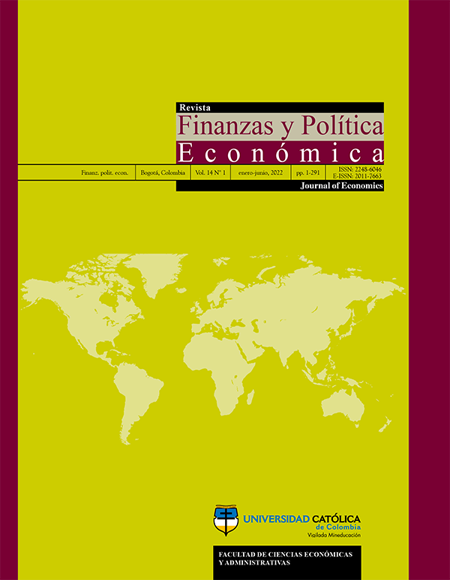
This work is licensed under a Creative Commons Attribution-NonCommercial-ShareAlike 4.0 International License.
This journal is licensed by a Creative Commons Attribution License (CC BY-NC-SA 4.0) Attribution-Non Commercial 4.0 International. For the CC licenses, the principle isthe creative freedom. This system complements the copyright without opposing it, conscious of its importance in our culture. The content of the articles is the responsibility of each author, and does not compromise in any way, to the journal or the university. It allows the transmission and reproduction of titles, abstracts and full content, with academic, scientific, cultural ends, provided acknowledgment of the respective source. This work cannot be used for commercial purposes.
They journal does not charge authors for submission or publication.
Abstract
Recent studies have recommended the use of more disaggregated world price measures when formulating empirical and theoretical models on business cycles, challenging thus the hypothesis that shocks to the terms of trade (TOT) are an essential source of cyclical fluctuations in emerging economies. This paper aims to analyze the impact of shocks to raw materials prices on business cycles, and to assess the capacity of TOT as a proxy in theoretical models. Using annual data for Ecuador, a SVAR was estimated in which multiple prices transmit global shocks, as well as an MX model with exogenous shocks to TOT. The results show that shocks explain between 23 % and 37 % of the fluctuations in domestic macroeconomic variables and that commodity terms of trade (CTOT) have the best performance in the MX model in relation to an empirical benchmark specification. These results corroborate the importance of shocks to commodity prices while revitalizing the role of TOT.

References
Aguiar, M. y Gopinath, G. (2007). Emerging market business cycles: The cycle is the trend. Journal of Political Economy, 115(1), 69-102. https://doi.org/10.1086/511283
Ben Zeev, N., Pappa, E. y Vicondoa, A. (2017). Emerging economies business cycles: The role of commodity terms of trade news. Journal of International Economics, 108, 368-376. https://doi.org/10.1016/j.jinteco.2017.07.008
Bergholt, D., Larsen, V. H. y Seneca, M. (2019). Business cycles in an oil economy. Journal of International Money and Finance, 96, 283-303. https://doi.org/10.1016/j.jimonfin.2017.07.005
Blanchard, O. J. y Galí, J. (2011). The macroeconomic effects of oil price shocks: Why are the 2000s so different from the 1970s? SSRN Electronic Journal, 13368, 373-421. https://www.nber.org/papers/w13368
Chari, V. V., Kehoe, P. J. y McGrattan, E. R. (2008). Are structural VARs with long-run restrictions useful in developing business cycle theory? Journal of Monetary Economics, 55(8), 1337-1352. https://doi.org/10.1016/j.jmoneco.2008.09.010
Drechsel, T. y Tenreyro, S. (2018). Commodity booms and busts in emerging economies. Journal of International Economics, 112, 200-218. https://doi.org/10.1016/j.jinteco.2017.12.009
Fernández, A., González, A. y Rodríguez, D. (2018). Sharing a ride on the commodities roller coaster: Common factors in business cycles of emerging economies. Journal of International Economics, 111, 99-121. https://doi.org/10.1016/j.jinteco.2017.11.008
Fernández, A., Schmitt-Grohé, S. y Uribe, M. (2017). World shocks, world prices, and business cycles: An empirical investigation. Journal of International Economics, 108, S2-S14. https://doi.org/10.1016/j.jinteco.2017.01.001
García-Cicco, J., Pancrazi, R. y Uribe, M. (2010). Real business cycles in emerging countries? American Economic Review, 100(5), 2510-2531. https://www.aeaweb.org/articles?id=10.1257/aer.100.5.2510
Gruss, B. y Kebhaj, S. (2019). Commodity terms of trade: A new database. https://ssrn.com/abstract=3333745
Kose, M. A. (2002). Explaining business cycles in small open economies: 'How much do world prices matter?'. Journal of International Economics, 56(2), 299-327. https://doi.org/10.1016/S0022-1996(01)00120-9
Mendoza, E. G. (1995). The Terms of Trade, the Real Exchange Rate, and Economic Fluctuations. International Economic Review, 36(1), 101. https://doi.org/10.2307/2527429
Organización Mundial del Comercio (OMC) (2020). Perfiles Comerciales 2020. Organización Mundial del Comercio, 1(1), 108-109. https://www.wto.org/english/res_e/booksp_e/trade_profiles20_e.pdf
Oviedo Gómez, A. F. y Sierra, L. P. (2019). Importancia de los términos de intercambio en la economía colombiana. Revista Cepal, 128, 125-154. http://hdl.handle.net/11362/44740
Roch, F. (2019). The adjustment to commodity price shocks. Journal of Applied Economics, 22(1), 437-467. https://doi.org/10.1080/15140326.2019.1665316
Schmitt-Grohé, S. y Uribe, M. (2018). How important are terms-of-trade shocks? International Economic Review, 59(1), 85-111. https://doi.org/10.1111/iere.12263
Shousa, S. (2016). Macroeconomic Effects of Commodity Booms and Busts: The Role of Financial Frictions. XVIII Seminario Anual de Metas para a Inflação do Banco Central do Brasil (pp. 1-57). https://www.bcb.gov.br/conteudo/eventos/Documents/seminariodemetas/XVIII/SMETASXVIII-%20Samer%20Shousha.pdf
Uribe, M. y Schmitt-Grohè, S. (2017). Importable Goods, Exportable Goods, and the Terms of Trade. En Open Economy Macroeconomics. Princeton: Princeton University Press.






























